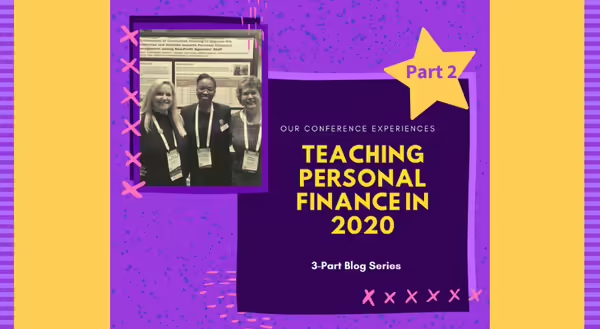
One of the best parts about attending professional conferences is the chance to update and reset my thinking about teaching personal finance. While teaching about money might sound like the same old, same old, there’s always something new to learn and share! Three topics stand out in my mind as I reflect on sessions I attended during the AFCPE Symposium.
How is COVID affecting people’s finances?
While it’s clear that the pandemic is having a financial impact on people’s lives, it affects people in different ways. I am thankful to have learned about the COVID-19 surveys prepared for NEFE (National Endowment for Financial Education) and shared by Dr. Hensley, which shed some light on our current situation. Here are a few takeaways from the survey:
- 84% of Americans say that something is causing them stress regarding their personal finances, considering the COVID-19 outbreak.
- 74% of U.S. adults have made financial adjustments due to the COVID-19 outbreak.
- 26% are increasing contributions to their emergency/retirement savings, but another 23% are using their savings.
- 41% of U.S. adults have provided assistance or support to family or friends, and 84% of these adults say it has caused a strain on their finances.
How does intimate partner violence intersect with financial education?
According to keynote speaker Sonya Passi, founder and CEO of FreeFrom, over 90% of intimate partner violence survivors are impacted by financial abuse. Her presentation, in her presentation, “Building Financial Security for Survivors of Intimate Partner Violence,” has spurred me to learn more about how controlling finances in a relationship may become an integral part of an abusive relationship.
FreeFrom’s recent report, “Survivors Know Best: How to Disrupt Intimate Partner Violence During COVID-19 and Beyond," a few key points are thought-provoking:
- In the United States, 1 in 4 women and nearly 1 in 2 trans people will experience intimate partner violence during their lifetime.
- The number one reason survivors stay in or return to abusive relationships is because they cannot afford to get or stay safe.
- 99% of survivors also experience economic abuse, which occurs when harm-doers control survivors’ access to financial resources
What are others doing for financial educational outreach during these extraordinary times?
Virtual, online, zoom, videos … many of the presentations focused on new outreach efforts or at least a new emphasis about online outreach. Best practices, trials and errors, and hope for improvement were common themes. In my evaluation, Illinois Extension compares well with other groups for rapidly shifting delivery modes. However, I did walk away with new motivation to further develop my video creation skills to reach people with timely financial education.
If you didn't have an opportunity to read part 1 of this series, take time to read Camaya Wallace Bechard's recent blog post.